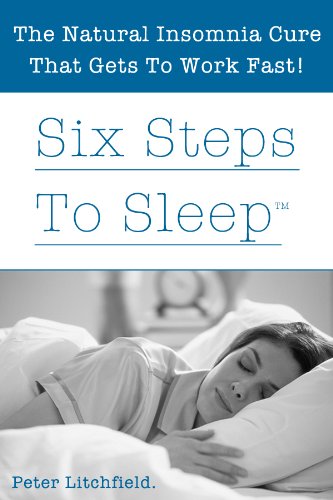 We’re pleased to introduce our newest guest blogger, Peter Litchfield, author of “Six Steps to Sleep.” A good, sound night’s sleep is something that doctors all recommend, and unfortunately many of us struggle to achieve. Through many years of discovery and research, Peter learned how to sleep better and cure his own insomnia once and for all. Along with his book, he created a program, also titled “Six Steps to Sleep” which employs natural methods to better sleep, and which he’s shared with more than 100,000 people. His program was recently recommended by the National Sleep Foundation.
We’re pleased to introduce our newest guest blogger, Peter Litchfield, author of “Six Steps to Sleep.” A good, sound night’s sleep is something that doctors all recommend, and unfortunately many of us struggle to achieve. Through many years of discovery and research, Peter learned how to sleep better and cure his own insomnia once and for all. Along with his book, he created a program, also titled “Six Steps to Sleep” which employs natural methods to better sleep, and which he’s shared with more than 100,000 people. His program was recently recommended by the National Sleep Foundation.
He’s generously shared his knowledge here with a guest post featuring not just six, but 10 recommended steps for a good night’s sleep – which will appear in Part Two of this post!
____________________________________________________________
How To Sleep Better In 10 Easy Steps (Part One)
Getting a good night’s sleep should be an easy, natural process; the day ends, you go to bed, sleep for 7 or 8 hours and wake feeling refreshed and raring to go. But for the large majority, the reality is quite different.
We’re sleeping 20% less than we did 100 years ago, and it’s costing us our health. In fact, the problem is so bad that 10 million Americans use prescription sleep aids, and more than 30% of the population suffers from insomnia. Lack of sleep has been linked to all sorts of health problems, including weight gain, weakened immunity, depreciating cardiovascular health and increased risk of depression, not to mention the risk of accidents – the National Roads and Motorists Association (NRMA) estimates fatigue is involved in one in six fatal road accidents.
Compounding our inability to get a proper night’s sleep is the allure of the 24-hour world, which is fuelled by the internet that enables non-stop communication, game playing and retail therapy. Add to the mix an increasing amount of stress and anxiety due to working too many hours and worrying about how to make ends meet and you’ve got the perfect recipe for insomnia.
Understanding the Human Sleep-Wake Cycle
In my experience, 90% of insomnia cases are self-inflicted, and I include my previous 15-year struggle in that figure, too. This might sound harsh to some, but the reality is that there are very few people who have insomnia because of a related health issue. Yes it’s true that many people who suffer depression and anxiety experience insomnia, but it’s also true that lack of sleep contributes greatly to these conditions, too.
In one major study of 10,000 adults, people with insomnia were five times more likely to develop depression. Lack of sleep can be an even greater risk factor for anxiety. In the same study, people with insomnia were 20 times more likely to develop panic disorder – a type of anxiety disorder. (Source: Resource from the Division of Sleep Medicine at Harvard Medical School)
We all have the ability to improve the health of our sleep-wake cycle by making positive lifestyle and environment adjustments, and doing so has a hugely positive effect on the way we feel, think and function. Once we educate ourselves on the process of sleep and the things that can interfere with the sleep-wake cycle, it is very easy to improve sleep quality.
For example, simply understanding that the sleep-wake cycle has been designed to work in tandem with the light and darkness of day offers insight as to how humans are supposed to sleep; it’s no coincidence that melatonin levels rise as darkness falls and remain elevated through the night. It’s also worth considering that our hunter-gatherer ancestors didn’t have streetlights, bedside lamps, televisions and such. They slept within a few hours of sun down and rose with the sunlight, enduring little mental stimulation through the evening. This is the natural human cycle, and shifting your sleep pattern in alignment with that cycle will improve sleep quality and overall health.
As wonderful as artificial light is, we abuse its capability at the expense of our sleep. Staring at your computer, phone or tablet screen into the early hours of the morning is likely to affect the quality of your sleep. This is because the brain responds to stimulation, thus the modern term ‘LCD insomnia’.
The fact is that humans have not adapted to the 24-hour lifestyle of excessive evening stimulation, nighttime food binging, all-night partying and surviving the day propped up by stimulants to combat lack of sleep. And so the most positive thing you can do to improve your sleep health is reduce exposure to brain-stimulating activities in the evening and develop a sleep-friendly routine.
(Stay tuned for Part Two – featuring the 10 tips for better sleep!)
____________________________________________________________






No Comments